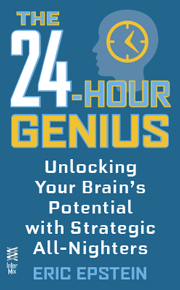
Is staying up all night the secret to success and creativity? Eric Epstein, the author of The 24-Hour Genius: Unlocking Your Brain’s Potential with Strategic All-Nighters, sure thinks so. Is the author some wild partier, or a stoner? Hardly. Epstein, 35, is a quiet-spoken corporate lawyer, who practices with a firm in New York City and teaches legal writing at Columbia Law School. He just wants the world to know to know that a well-planned all-nighter can boost your creative juices — even advance your career.
Giving his persuasive new e-book a spin, I met Epstein yesterday at midnight at The French Roast, a busy all-night restaurant on Manhattan’s Upper West Side. I quickly discovered one of the tools in his professional arsenal: caffeine, in the form of two cappuccinos. But Epstein is a purist: he swears he has never used a single No-Doz tablet or Red Bull energy drink, much less an unlawful upper. “The only stimulant I will use—and I do use it liberally—is coffee,” he said.
Epstein is eager to let you know that he is not against sleep, which he says is healthy and live-sustaining. That said, I haven’t met anyone as enthused about pulling all-nighters since I was a freshman in college. He certainly practices what he preaches, staying up all night two or three times, on average, every month.
Epstein enthusiastically confides that “in the big picture, you can enjoy all the benefits of sleep, while at the same time, strategically targeting an aspect of a project that you want to tackle in a different way.” Having a professor who advocates judiciously studying through the night when it’s necessary goes over well with the law students that Epstein teaches. “All-nighters go hand in hand with the first year of law school,” he says knowingly.
Epstein, who has always been a bit of a night owl, says that he first discovered the benefits of staying up round-the-clock in college when he was working in 1998 part-time as a stringer for the New York Times. By day, he was going to school; by night, he was writing stories on tight deadlines. “Juggling all of that, I found myself pulling all-nighters with some regularity.”
His extensive research for the book established that many famous people have followed the same recipe for success. Edison stands out as the all-time nocturnal champ: he would work almost 100 hours without sleep when he was in an inventive frenzy. There was, of course, the real-life midnight ride of Paul Revere, as well as the Rolling Stones’ round-the-clock creation of Exile on Main Street in 1972, perhaps their finest album. Not surprisingly, the Saturday Night Live cast has regularly scheduled round-the-clock work-a-thons, “In scratching the surface of almost any notable success story, it was surprisingly easy to find all-nighters as the story behind the story,” he says earnestly.
Epstein isn’t a proselytizer, though. If the shoe doesn’t fit, don’t wear it, he told me. “If you try it and it’s just not you, you shouldn’t do it as a creative process.” He adds, “There are vast individual differences of sleep deprivation from military studies.” (Yes, Uncle Same has studied how well soldiers do with no sleep.)
Epstein’s own wife, Jena, is “more of a morning person. But, he says, “she’s a remarkable woman. I’m very lucky. She tolerates me.” Epstein’s ability to stay up late when necessary will soon come in handy on the home front; Jena, a teacher at a private school, is a few months away from giving birth to their first child.
At 1:30 am, buoyed by a strong cup of coffee, I took leave of the author and discovered, in the cab on my way home, that the City that Never Sleeps was, in fact, sleeping early Monday morning, as the 9-5’ers boringly snoozed.


